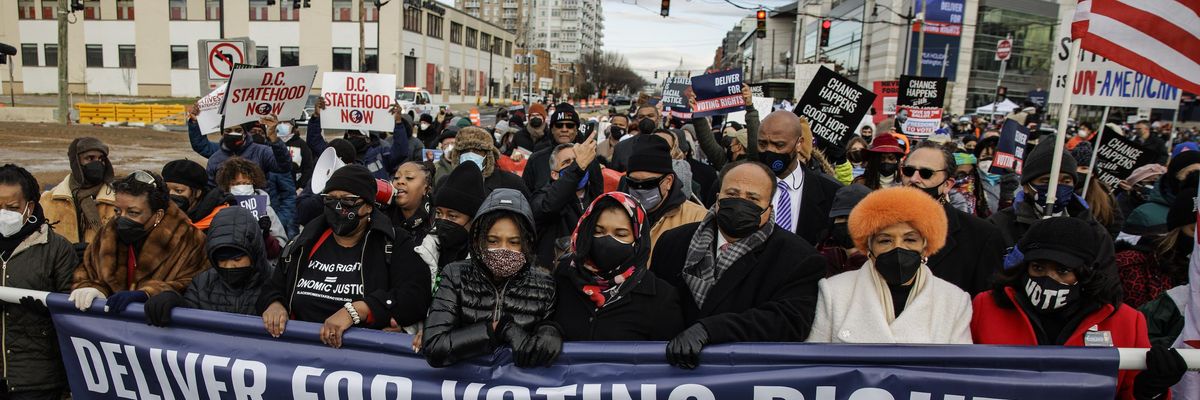Amid continued GOP obstruction of Democrats' voting rights legislation, a coalition of civil rights groups on Monday issued a joint statement pushing back against a bipartisan plan to reform the Electoral Count Act, calling the proposal woefully insufficient to address nationwide voter suppression efforts.
"Bipartisanship for bipartisanship's sake does nothing for a citizen whose right to vote has been compromised by partisan extremists in states."
The core of the issue, the groups said, is that the plan to tweak the law, while offering some "important and needed protections to ensure the integrity of the presidential election of 2024," simply "does not address the ongoing pernicious and pervasive racial discrimination in voting nor does it make voting more accessible."
Issued by organizations including the National Coalition on Black Civic Participation, the Leadership Conference on Civil and Human Rights, and the NAACP, the statement calls pursuit of the bipartisan plan alone--without passage of the more sweeping John Lewis Voting Rights Advancement Act and the Freedom to Vote Act--"offensive to voters, especially voters of color, and the generations who bled and died for the franchise since our nation's founding."
"Bipartisanship for bipartisanship's sake does nothing for a citizen whose right to vote has been compromised by partisan extremists in states," they continued. "Worse, some might view this effort as a cynical attempt to fool the American people into believing meaningful action has been taken on voting rights when none has been taken. We won't participate in that charade."
"Compromise is a worthy goal, but any compromise on voting rights must center on tearing down barriers to the ballot for Black people and other people of color, Native Americans and Alaskan Natives, people with disabilities, senior citizens, veterans, new Americans, and young people," the groups stated, and warned the nation's "democracy remains on the line."
The statement further calls on Congress to "include the John Lewis Voting Rights Advancement Act and key provisions of the Freedom to Vote Act in any legislation that is considered to safeguard our democracy."
Earlier this month, the plan to enact reforms to the Electoral Count Act also elicited concerns from progressives, especially as Senate Minority Leader Mitch McConnell (R-Ky.) expressed openness to the proposal and since the bipartisan group of senators involved in the effort includes Sens. Joe Manchin (D-W.Va.) and Kyrsten Sinema (D-Ariz.), who joined with Republicans to block the Freedom to Vote: John R. Lewis Act.
As Politicoreported last week:
While tackling the outdated Electoral Count Act is popular among scholars after Republicans challenged the election results last year and a pro-Trump mob stormed the Capitol, both parties have used the arcane text to force votes on election certifications. The upper-chamber negotiators are now aiming to make it harder for senators to object to those certifications, and to clarify that the vice president cannot unilaterally overturn the election...
Before the group developed, most Democrats had dismissed the more narrow electoral discussions that took off in recent weeks, trying to downplay them as a politically motivated off-ramp for Republicans to avoid blame ahead of the failed vote on a Senate rules change.
In a letter to senators earlier this month, the advocacy group Common Cause said that looking at changes to the Electoral Count Act and legislative proposals to tackle voter suppression as an either-or scenario represents "a false choice."
"Reforms to how the score is counted will not unrig the rules that are stacked against voters and their participation," the group said.
In a statement, Common Cause president Karen Hobert Flynn expressed concern that "voting rights in states across the country are under siege as legislators write and pass a new generation of Jim Crow laws to determine who can and cannot vote."
"The Electoral Count Act does in fact need fixing," she said, "but first the Senate must pass legislation to protect the voting rights of every American--particularly Black and Brown Americans targeted by the wave of 21st Century Jim Crow laws being passed in the states."
